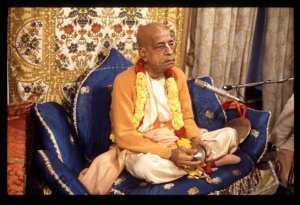CC Madhya 6.120: Difference between revisions
m (1 revision(s)) |
(Vanibot #0054 edit - transform synonyms into clickable links, which search similar occurrences) |
||
| (One intermediate revision by one other user not shown) | |||
| Line 1: | Line 1: | ||
{{ | [[Category:Sri Caitanya-caritamrta - Madhya-lila Chapter 06|C120]] | ||
<div style="float:left">'''[[Sri Caitanya-caritamrta|Śrī Caitanya-caritāmṛta]] - [[CC Madhya|Madhya-līlā]] - [[CC Madhya 6|Chapter 6: The Liberation of Sārvabhauma Bhaṭṭācārya]]'''</div> | |||
<div style="float:right">[[File:Go-previous.png|link=CC Madhya 6.119|Madhya-līlā 6.119]] '''[[CC Madhya 6.119|Madhya-līlā 6.119]] - [[CC Madhya 6.121|Madhya-līlā 6.121]]''' [[File:Go-next.png|link=CC Madhya 6.121|Madhya-līlā 6.121]]</div> | |||
{{CompareVersions|CC|Madhya 6.120|CC 1975|CC 1996}} | |||
{{RandomImage}} | |||
==== TEXT 120 ==== | ==== TEXT 120 ==== | ||
<div | <div class="verse"> | ||
vedānta paḍāite tabe ārambha karilā | :vedānta paḍāite tabe ārambha karilā | ||
sneha-bhakti kari’ kichu prabhure kahilā | :sneha-bhakti kari’ kichu prabhure kahilā | ||
</div> | </div> | ||
| Line 12: | Line 16: | ||
==== SYNONYMS ==== | ==== SYNONYMS ==== | ||
<div | <div class="synonyms"> | ||
''[//vanipedia.org/wiki/Special:VaniSearch?s=vedānta&tab=syno_o&ds=1 vedānta]'' — Vedānta philosophy; ''[//vanipedia.org/wiki/Special:VaniSearch?s=paḍāite&tab=syno_o&ds=1 paḍāite]'' — to instruct; ''[//vanipedia.org/wiki/Special:VaniSearch?s=tabe&tab=syno_o&ds=1 tabe]'' — then; ''[//vanipedia.org/wiki/Special:VaniSearch?s=ārambha&tab=syno_o&ds=1 ārambha]'' — beginning; ''[//vanipedia.org/wiki/Special:VaniSearch?s=karilā&tab=syno_o&ds=1 karilā]'' — made; ''[//vanipedia.org/wiki/Special:VaniSearch?s=sneha&tab=syno_o&ds=1 sneha]'' — affection; ''[//vanipedia.org/wiki/Special:VaniSearch?s=bhakti&tab=syno_o&ds=1 bhakti]'' — and devotion; ''[//vanipedia.org/wiki/Special:VaniSearch?s=kari’&tab=syno_o&ds=1 kari’]'' — showing; ''[//vanipedia.org/wiki/Special:VaniSearch?s=kichu&tab=syno_o&ds=1 kichu]'' — something; ''[//vanipedia.org/wiki/Special:VaniSearch?s=prabhure&tab=syno_o&ds=1 prabhure]'' — unto the Lord; ''[//vanipedia.org/wiki/Special:VaniSearch?s=kahilā&tab=syno_o&ds=1 kahilā]'' — said. | |||
</div> | </div> | ||
| Line 19: | Line 23: | ||
==== TRANSLATION ==== | ==== TRANSLATION ==== | ||
<div | <div class="translation"> | ||
He then began to instruct Lord Caitanya Mahāprabhu on Vedānta philosophy, and out of affection and devotion, he spoke to the Lord as follows. | He then began to instruct Lord Caitanya Mahāprabhu on Vedānta philosophy, and out of affection and devotion, he spoke to the Lord as follows. | ||
</div> | </div> | ||
| Line 26: | Line 30: | ||
==== PURPORT ==== | ==== PURPORT ==== | ||
<div | <div class="purport"> | ||
The Vedānta- or Brahma-sūtra, written by Śrīla Vyāsadeva, is a book studied by all advanced spiritual students, especially by the sannyāsīs of all religious communities (sampradāyas). The sannyāsīs must read the Vedānta-sūtra to establish their final conclusions concerning Vedic knowledge. Here, of course, the Vedānta mentioned is the commentary of Śaṅkarācārya, known as Śārīraka-bhāṣya. Sārvabhauma Bhaṭṭācārya intended to convert Caitanya Mahāprabhu, who was a Vaiṣṇava sannyāsī, into a Māyāvādī sannyāsī. He therefore made this arrangement to instruct Him in the Vedānta-sūtra according to the | The ''Vedānta-'' or ''Brahma-sūtra'', written by Śrīla Vyāsadeva, is a book studied by all advanced spiritual students, especially by the ''sannyāsīs'' of all religious communities (''sampradāyas''). The ''sannyāsīs'' must read the ''Vedānta-sūtra'' to establish their final conclusions concerning Vedic knowledge. Here, of course, the ''Vedānta'' mentioned is the commentary of Śaṅkarācārya, known as Śārīraka-bhāṣya. ''Sārvabhauma'' ''Bhaṭṭācārya ''intended'' to convert Caitanya Mahāprabhu, who was a Vaiṣṇava ''sannyāsī'', into a Māyāvādī ''sannyāsī''. He therefore made this arrangement to instruct Him in the ''Vedānta-sūtra'' according to the ''Śārī'raka'' commentary' of Śaṅkarācārya. All the ''sannyāsīs'' of the Śaṅkara-sampradāya enjoy seriously studying the ''Vedānta-sūtra'' with the ''Śārīraka-bhāṣya'' commentary. It is said, ''vedānta-vākyeṣu sadā ramantaḥ'': “One should always enjoy the studies of the ''Vedānta-sūtra''.” | ||
</div> | </div> | ||
__NOTOC__ | |||
<div style="float:right; clear:both;">[[File:Go-previous.png|link=CC Madhya 6.119|Madhya-līlā 6.119]] '''[[CC Madhya 6.119|Madhya-līlā 6.119]] - [[CC Madhya 6.121|Madhya-līlā 6.121]]''' [[File:Go-next.png|link=CC Madhya 6.121|Madhya-līlā 6.121]]</div> | |||
__NOTOC__ | |||
__NOEDITSECTION__ | |||
Latest revision as of 23:39, 19 February 2024

A.C. Bhaktivedanta Swami Prabhupada
TEXT 120
- vedānta paḍāite tabe ārambha karilā
- sneha-bhakti kari’ kichu prabhure kahilā
SYNONYMS
vedānta — Vedānta philosophy; paḍāite — to instruct; tabe — then; ārambha — beginning; karilā — made; sneha — affection; bhakti — and devotion; kari’ — showing; kichu — something; prabhure — unto the Lord; kahilā — said.
TRANSLATION
He then began to instruct Lord Caitanya Mahāprabhu on Vedānta philosophy, and out of affection and devotion, he spoke to the Lord as follows.
PURPORT
The Vedānta- or Brahma-sūtra, written by Śrīla Vyāsadeva, is a book studied by all advanced spiritual students, especially by the sannyāsīs of all religious communities (sampradāyas). The sannyāsīs must read the Vedānta-sūtra to establish their final conclusions concerning Vedic knowledge. Here, of course, the Vedānta mentioned is the commentary of Śaṅkarācārya, known as Śārīraka-bhāṣya. Sārvabhauma Bhaṭṭācārya intended to convert Caitanya Mahāprabhu, who was a Vaiṣṇava sannyāsī, into a Māyāvādī sannyāsī. He therefore made this arrangement to instruct Him in the Vedānta-sūtra according to the Śārī'raka commentary' of Śaṅkarācārya. All the sannyāsīs of the Śaṅkara-sampradāya enjoy seriously studying the Vedānta-sūtra with the Śārīraka-bhāṣya commentary. It is said, vedānta-vākyeṣu sadā ramantaḥ: “One should always enjoy the studies of the Vedānta-sūtra.”